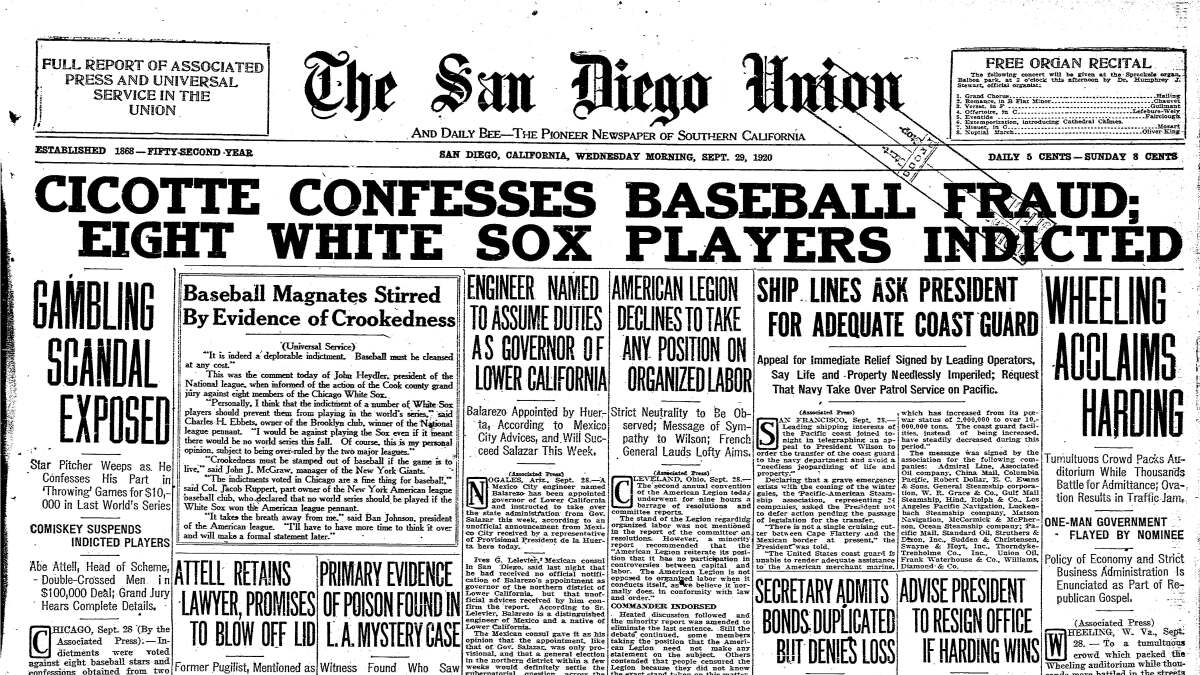The Chicago White Sox were the best team in baseball in 1919. They were the clear favorites to win the World Series. But they didn’t. Because some of the players cheated. It all started when infielder Chick Gandil contacted some gamblers and offered to fix the games. Gandil headed a faction of teammates who were on the shady side. The clean players refused to talk to them so the clubhouse was very tense. Gamblers slipping underpaid ballplayers cash for inside tips had been common in major league baseball, but this took it to a new level. The gamblers agreed to pay any participating players $100,000 total. Gandil recruited 29 game winner Eddie Cicotte. Others included pitcher Claude “Lefty” Williams, shortstop Charles “Swede” Risberg (Cicotte’s enforcer), outfielder Oscar “Happy” Felsch, utility infielder Fred McMullin (he played little and said he only overheard some conversations), and Buck Weaver (who attended some early meetings, but was not a part of the fix). The White Sox’ superstar “Shoeless Joe” Jackson was paid $5,000 (although he had been promised $20,000). Jackson was one of the best hitters in baseball and a future Hall of Famer. His career batting average of .356 is fourth all-time. The myth was that the White Sox owner, Charles Comiskey, was a notorious skin-flint and underpaid his players unfairly. He did make them wash their own uniforms, but the White Sox had the second highest payroll in MLB. (There is a believe that the term “Black Sox” came from the players refusing to wash their uniforms which became increasingly dirty. However, it is more likely the name came from the press.) Apparently, Cicotte got the idea from the rumor that Chicago Cubs players had thrown the 1918 World Series for payoffs. Before the 1919 series, rumors were abundant about the scheme and the odds that heavily favored the White Sox went down by the time the Series started. Cicotte started the first game and immediately hit the first batter. This was the signal that the fix was on. He made several more “mistakes”. The Reds won 9-1. They won the second game 4-2. Williams walked three in a row. Williams lost all three games he pitched in with a 6.63 ERA. The team went down 4 games to 1 (in a best of nine series) when failure to receive payments caused the players to revolt and win the next two. Supposedly, threats to their families got them back on track and the Reds won the last game 10-5. Although they did not receive the full $100,000 (Gandil got $35,000 and Cicotte $10,000), the White Sox lost enough games suspiciously to cause concern. Rumors of corruption led to the arrest of the eight players on charges of conspiracy to defraud the public and injure the American League. Although some of the players testified that they did accept money from gamblers, none were found guilty due to lack of evidence. Confessions by Cicotte and Jackson mysteriously disappeared. A gambler named Bill Burns turned states evidence and testified to the fix, but it wasn’t enough. The trial ended on August 2, 1921 after the jury deliberated for only three hours. The defendants were all found innocent. However, before the eight could return to the field, Commissioner Judge Kenesaw Mountain Landis banned all of them for life. Landis had been appointed with dictatorial power over MLB and was given the task of cleaning up baseball. He did not care about the not guilty verdict. He might have been a little harsh with some of the players, especially Buck Weaver He probably got most of it right, but Buck Weaver almost surely only knew about the plot and did not participate in throwing any games. Shoeless Joe Jackson had not played badly. He batted .375 in the series with six RBIs and no errors. He did bat only .286 in the games the White Sox lost, but he hit a homer in one of them. He was not the most intelligent player in baseball, so his recanting his confession might have been the truth. But he had pocketed the $5,000. Just like the much lesser players, his career was over. And no Hall of Fame for him. “Say it ain’t so, Joe” a little boy supposedly said to him.
- Amazing 183-184
- https://www.history.com/news/black-sox-baseball-scandal-1919-world-series-chicago
- https://sabr.org/journal/article/the-black-sox-scandal/
- https://en.wikipedia.org/wiki/Black_Sox_Scandal

0 Comments